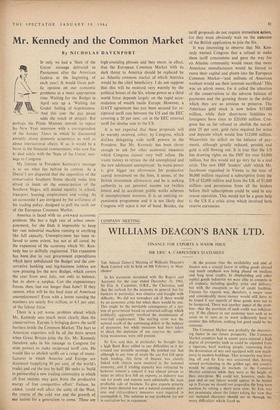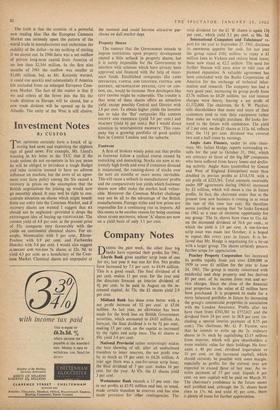Mr. Kennedy and the Common Market
By NICHOLAS DAVENPORT My interest in President Kennedy's message is to see what lies behind its content. As a liberal I am disgusted that the opposition of the conservative Southern States should make him afraid to insist on the emancipation of the Southern Negro, still denied equality in school. transport. housing, employment and voting. As an economist I am intrigued by the artfulness of his trading policy, designed to pull the teeth out of the European Common Market.
America is faced with an awkward economic problem. She has a high rate of urban unem- pioyment, for she finds it impossible to keep her vast industrial machine running at anything like full capacity. Unemployment has been re- lieved to some extent, but not at all cured, by the expansion of the economy which Mr. Ken- nedy has so skilfully engineered. This expansion has been due to vast government expenditures which have unbalanced the Budget and the con- servative banking and big-business lobbies are now pressing for the next Budget, which covers the year from next July, not only to balance, , but to show a surplus. Can the expansionary forces, then, last out longer than June? If they cannot, what will be the final state of American unemployment? Even with a boom running the numbers are nearly five million, or 6.1 per cent. of the labour force.
There is a yet worse problem ahead which Mr. Kennedy sees much more clearly than the conservatives. Europe is bringing down the tariff barriers inside the Common Market. The hurt to American exporters will be all the ihore severe when Great Britain joins the Six. Mr. 'Kennedy therefore asks in his message to Congress for wide powers to make reciprocal tariff cuts. He would like to abolish tariffs on a range of manu- factures in which America and Europe are dominant (supplying 80 per cent. of the world's trade) and cut the rest by half. He seeks to 'build in partnership a new trading community in which all free nations may gain, from the productive energy of free competitive effort.' Failure, he added, 'could well affect the unity of the West, the course of the cold war and the growth of our nation for a generation to come.' These are high-sounding phrases and they mean, in effect, that the European Common Market with its dark threat to America should be replaced by an Atlantic common market of which America would be the chief beneficiary. I do not suppose that this will be received very warmly by the political bosses of the Six, whose power as a third world force depends largely on the rapid accu- mulation of wealth inside Europe. However, a GATT agreement has just been secured for re- ciprocal tariff cuts between the US and the EEC covering a 20 per cent. cut in the EEC external tariff for similar cuts in the US.
It is not expected that these proposals will be warmly received, either, by Congress, which dislikes delegating wide tariff powers to the President. But Mr. Kennedy has been clever enough to ask for other economic measures which Congress cannot very well refuse. ►-le wants money to retrain the old unemployed and the new adolescent unemployed: he wants power to give bigger tax allowances for productive capital investment on the lines, it seems, of the British investment allowances and he is seeking authority to cut personal income tax (within limits) and to accelerate public works schemes if unemployment worsens. It is an enticing ex- pansionist programme and it is not likely that Congress will reject it out of hand. Besides, the tariff proposals do not require immediate action, for they must obviously wait on the outcome of the British application to join the Six.
It was interesting to observe that Mr. Ken- nedy warned Congress that a refusal to make these tariff concessions and pave the way for an Atlantic community would mean that more American manufacturers would be forced to move their capital and plants into the European Common Market—'and millions of American workers would see their interests sacrificed.' This was an adroit move, for it called the attention of the conservatives to the adverse balance of payments and the growing threat to the dollar which they are so anxious to preserve. The American gold stock is now below $17,000 million, while their short-term liabilities to foreigners have risen to $20,000 million. Con- gress has so far refused to abolish the out-of- date 25 per cent. gold ratio required for notes and deposits which would free $12,000 million. Meanwhile the deficit on the balance of pay- ments, although greatly reduced, persists and gold is still flowing out. It is true that the US has drawing rights on the IMF for over $4,000 million, but this would not go very far in a real crisis. The new IMF 'lenders' club' which Mr. Jacobsson organised in Vienna to the tune of $6,000 million required a subscription from the US of $2,000 million and from the UK of $1,000 million—and permission from all the lenders before their subscriptions could be used in any rescue operation. This would not be a great help to the US if a crisis arose which involved both reserve currencies. The truth is that the creation of a powerful new trading bloc like the European Common Market can seriously upset the pattern of the world trade in manufacturers and undermine the stability of the dollar-to say nothing of sterling if we stayed out. In 1960 there was a net outflow of private long-term capital from America of no less than $2,544 million. In the first nine months of 1961 the outflow was smaller at $1,681 million, but, as Mr. Kennedy warned, it could rise quickly and substantially if America felt excluded from an enlarged European Com- mon Market. The fact of the matter is that if we and others of the Seven join the Six the Dade division in Europe will be closed, but a new trade division will be opened up in the Atlantic. The unity of the West is still elusive.



































 Previous page
Previous page